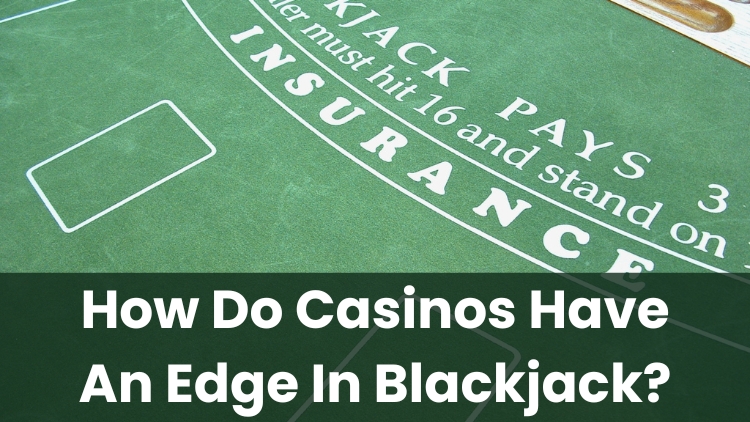
Blackjack is a popular casino game known for its simplicity and entertainment; however, have you ever wondered why casinos often seem to win at blackjack?
Learning about the advantages built into blackjack to favour the casino will help improve your experience and your understanding of the game, ensuring you make more informed decisions at the table.
In this blog post, we'll explain what the house edge is in blackjack and how it favours the casino. We'll also explore how the dealer seems to have an advantage in blackjack and the idea of the dealer always being able to win.
What Is The House Edge In Blackjack?
The house edge in blackjack is a term used to describe the statistical advantage that the casino holds over the player. It’s how casinos ensure they earn a profit over time, even while players are enjoying short-term wins.
The house edge in blackjack can be around 0.5% if you use basic strategy, meaning for every £100 you wager, on average, the casino anticipates a profit of about 50p from your bets over the long run.
This house edge isn't fixed, as it can vary based on specific house rules and your approach to the game. For instance, if a casino pays 6:5 instead of 3:2 for a blackjack, the house edge increases.
You may wonder why such a small percentage matters. Over hundreds or thousands of hands, this advantage can potentially lead to significant profits for the casino.
What Is The House Edge In Blackjack With Basic Strategy?
The house edge in blackjack is the casino’s built-in advantage; however, this edge can be significantly reduced by using a basic strategy.
A basic strategy is a collection of well-researched guidelines that help you make the best possible decisions based on your hand and the dealer's visible card. It simplifies your choices, providing clear recommendations on when to hit, stand, double down, or split your cards.
By following these guidelines, you can potentially lower the house edge to about 0.5%. It is important to remember the house edge represents the casino's advantage over the long run, not every individual hand.
Using basic strategy doesn't guarantee a win every time; however, it does allow you to make more informed choices. This means you're playing smarter and maximising your chances of success while reducing the casino's advantage.
For those who enjoy blackjack and want to keep the casino’s edge to a minimum, basic strategy is a valuable tool. It helps keep the game entertaining and responsible, allowing for an enjoyable experience while maintaining awareness of the risks involved.
How Much Of An Edge Does The Dealer Have In Blackjack?
The dealer's edge in blackjack comes from the game’s rules and the way it is played. It’s important to understand that this edge isn’t fixed; it varies based on the rules of the particular game you’re sitting down to play.
In classic blackjack, if you use a solid basic strategy, the house edge is typically around 0.5%; however, if you don’t use basic strategy, the house edge can increase, often ranging from 1% to as much as 3%.
There are numerous variations of blackjack, each with its own rules that can affect the house edge slightly.
For example, if you’re playing a version where the dealer must hit on a soft 17 (a hand including an ace valued as either 1 or 11), the house edge can increase. Similarly, games that restrict doubling down or splitting pairs can tip the odds further in the dealer's favour.
Why Does The Dealer Always Win In Blackjack?
It may seem like the dealer always has the upper hand in blackjack, but there’s more to it than just chance.
The game is designed with rules that give the casino a small advantage, known as the house edge, which is a built-in mathematical advantage that ensures casinos remain profitable over time.
One key factor that works in the dealer’s favour is the order of play. You, as the player, must decide whether to hit or stand before the dealer makes their move.
If your hand goes over 21, which is called busting, you lose immediately, no matter what the dealer’s hand looks like. This rule means that when you bust, the dealer wins without needing to do anything.
Blackjack also involves the element of chance, as the cards you and the dealer receive are completely random, meaning chance plays a role in the outcome of each game.
By understanding how the house edge and game rules work, you can see why the dealer often seems to win. This knowledge helps you approach the game with realistic expectations and make better decisions while playing.
Always remember to gamble responsibly for an enjoyable gaming experience. Ensure your blackjack experience remains safe and entertaining by setting limits to your playing time, sticking to a strict budget within your means and making use of any responsible gambling tools available.
*All values (Bet Levels, Maximum Wins, etc.) mentioned in relation to this game are subject to change at any time. Game features mentioned may not be available in some jurisdictions.
**The information provided in this blog is intended for educational purposes and should not be construed as betting advice or a guarantee of success. Always gamble responsibly.
